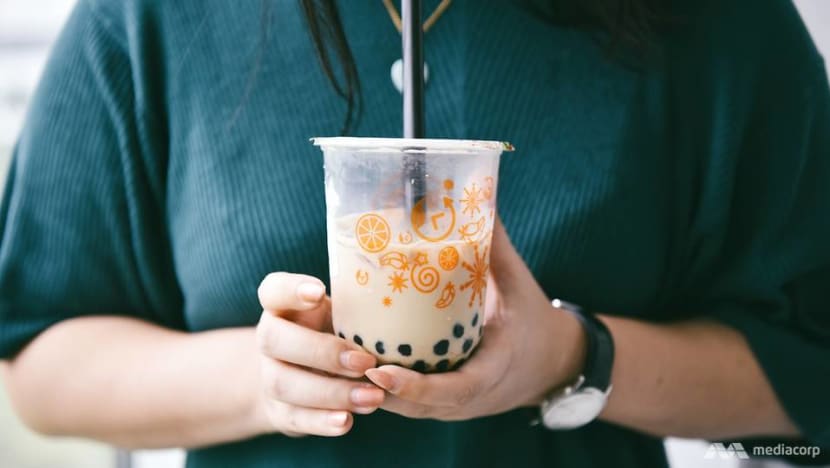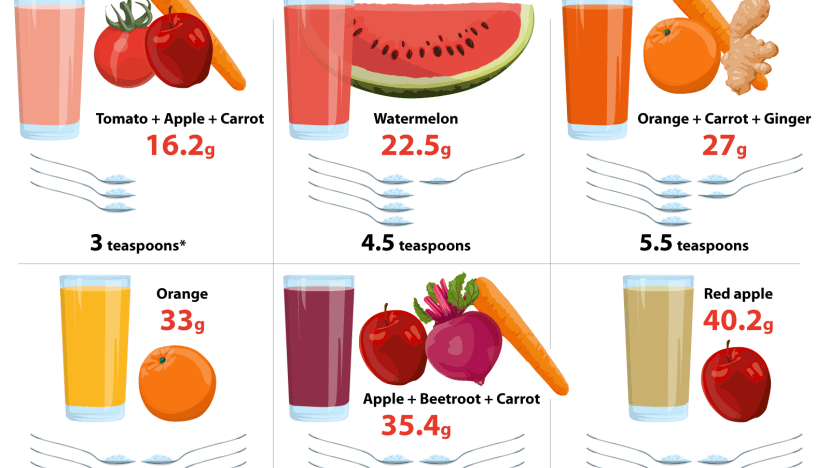commentary Commentary
Commentary: Mandatory nutrition labels? The bitter truths about our sugar problem
False assumptions and fixed mindsets are the root issues behind our diabetes problem. Will the new nutrition labels fix these? Ian Tan explores the challenges.

File photo of bubble tea. (Photo: Marcus Mark Ramos)
SINGAPORE: The war on sugar consumption is ramping up.
Singapore will be the first country in the world to ban advertisements of pre-packaged drinks with high sugar content, and it is also making nutrition labels mandatory for such drinks.
Our Government is leading the Southeast-Asian region on tackling the diabetes problem, but are these new rules able to effectively deal with the root issues of false assumptions and fixed mindsets?
FALSE ASSUMPTIONS
Here is a quick pop quiz. Which of the following do you believe to be beneficial for you: Fruit juice, isotonic drinks or energy drinks?
The answer is none of the above.
Fruit juices have a high amount of sugar - a cup of orange juice has as much sugar as a soft drink. It is always better to eat an orange instead if you want to be healthy as its dietary fibres and vitamins have not been stripped away.
READ: That cup of fresh fruit juice could contain as much sugar as a soft drink
Isotonic drinks are marketed to help you replenish your bodily salts and sugars after exercise. But the effectiveness of such drinks has been questioned by scientific research and many of these drinks have high sugar content.
In most cases, drinking plain water is the best way to rehydrate.

Energy drinks are used by many as a quick pick-me-up, and even though there have been recent launches of zero-sugar variants, the most popular energy drinks are very sweet in taste.
A good alternative to energy drinks is plain black coffee (without sugar or milk) as it contains very few calories.
Why do such false assumptions persist?
The lack of basic food nutrition knowledge among many people means that they cannot discern which types of food or drinks are causing their weight gain.
People are often surprised when I tell them that the major culprit in their weight gain is probably sugary drinks. Their assumption is their weight gain is largely caused by food dishes or the lack of exercise.
READ: Why snacking could be damaging your health, a commentary
READ: Healthier options ‘killing the hawker vibe’? Why so resistant, Singaporeans? A commentary
That may be the case, but think about it - most of us do not eat char kuay teow daily, but we may gulp down soft drinks, sweetened soya bean drinks and bubble tea daily without thinking.
Will the new nutrition labels help change these assumptions? Only time will tell, but if people are not told the hard truths (say, about fruit juices), they may never know.
The mandatory nutrition labels should also help prevent the sneaky ways that calories are increasingly “hidden” on some drink packaging today to make them appear more healthy.
If you read the current nutritional labels on some drinks, they claim each serving has only 40 kCal per serving, but you may miss the fine print that the packet actually contains three servings - hence each pack really contains 120 kCal of energy.
FIXED MINDSETS
Singaporeans spend a lot of time discussing topics like PSLE math questions, housing prices and investment vehicles, but they probably do not talk about diabetes until they get hit by it.
Unknown to many locals, the diabetes risk is high, with Singapore having some of the highest diabetes rates in the world. Today, 11 per cent of Singaporeans aged 18 to 69 have diabetes, and 14 per cent in the same age group have pre-diabetes.
More than any government body in the region, our Health Promotion Board has gone all in to spread the word on diabetes – bus stop ads, HDB lift decals, National Step Challenge activities and so on.
But mindsets are difficult to change.
Just observe your daily surroundings to take a gauge of the general indifference to diabetes or sugar consumption.
I would wager that when office workers debate their lunch options, the D-word does not come to mind.
Office work areas are often well-stocked with sugary snacks for employees to deal with work stress or boredom. (How many times have you heard people complain about gaining weight after they start work?)
READ: Commentary: Planning to eat at your office desk again? Here’s why you should have a proper meal

During group dinners in a restaurant, people no longer question the lack of freely available plain water.
When prepping for ethnic celebrations like Chinese New Year, people snap up cartons of soft drinks to serve their relatives and friends, otherwise one might be seen as a lousy host.
Apart from sugary drinks, there is also too much sugar in daily indulgences like pastries, restaurant food and processed supermarket food.
The Government cannot possibly regulate every type of sweet food – even food gravy may contain sugar – so it is up to us to take personal responsibility for our health.
Changing mindsets may prove especially challenging in food-crazy Singapore, where finding (and queuing for) the tastiest dishes is a national pastime.
LISTEN: The Pulse podcast - The struggle to eat healthy while loving fast food fads
The good news is that abstaining totally from sugar and other rich foods is not the answer.
You just need to manage your intake and not live such a bitter life (literally).
START AT HOME
Changing mindsets and eating habits are things that need to start at home, not in school or the office, or from a government brochure.

Commentary: How much do sedentary people really need to move? Less than you think
For a start, parents can play a huge role in their children’s eating habits.
When we eat out, my family (wife, two teenagers and me) do not drink soft drinks unless we can share a single serving. We each have different-sized water bottles for different occasions, and we only fill them with plain water from the tap or water coolers.
Nobody is unhappy about the lack of sweet beverages in my family. It is simply the way we have lived for many years.
If one of my teenagers wants to buy bubble tea, I would point out the sugar content but will not stop them from drinking it.
Instead, I encourage them to share it, which is a more positive way of managing sugar intake without depriving oneself.
I too, have a sweet tooth and always take a sip to get the pleasurable sugar rush.
But to finish the whole 400 kCal cup by myself? Oh, the horror.
Ian Tan is a marketing professional, former journalist and author of the book Anyone Can Lose Weight. By counting his calories, Ian lost 10kg in 2013. His 63kg body weight and BMI of 21.5 have remained constant for the past six years.














